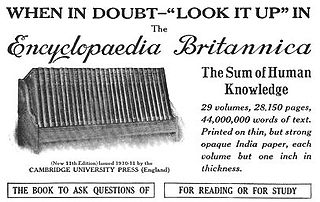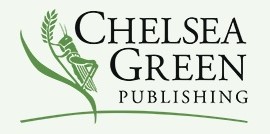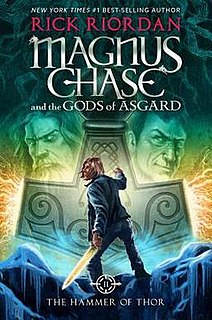
Baen Books is an American publishing house for science fiction and fantasy. In science fiction, it emphasizes space opera, hard science fiction, and military science fiction. The company was established in 1983 by science fiction publisher and editor Jim Baen. After his death in 2006, he was succeeded as publisher by long-time executive editor Toni Weisskopf.
The New York Times Best Seller list is widely considered the preeminent list of best-selling books in the United States. It has been published weekly in The New York Times Book Review since October 12, 1931. In the 21st century, it has evolved into multiple lists, grouped by genre and format, including fiction and non-fiction, hardcover, paperback and electronic.

Print on demand (POD) is a printing technology and business process in which book copies are not printed until the company receives an order, allowing prints of single or small quantities. While other industries established the build to order business model, "print on demand" could only develop after the beginning of digital printing, because it was not economical to print single copies using traditional printing technology such as letterpress and offset printing.

An out-of-print book is a book that is no longer being published. The term can apply to specific editions of more popular works, which may then go in and out of print repeatedly, or to the sole printed edition of a work, which is not picked up again by any future publishers for reprint. Most works that have ever been published are out of print at any given time, while certain highly popular books, such as the Bible, are always "in print". Less popular out-of-print books are often rare and may be difficult to acquire unless scanned or electronic copies of the books are available. With the advent of book scanning, and print-on-demand technology, fewer and fewer works are now considered truly out of print.

Remaindered books or remainders are printed books that are no longer selling well, and whose remaining unsold copies are liquidated by the publisher at greatly reduced prices. While the publisher may take a net loss on the sales of these books, they are able to recover at least some of their sunken costs on the sale and clear out space in the warehouses.
Thor Power Tool Company v. Commissioner, 439 U.S. 522 (1979), was a United States Supreme Court case in which the Court upheld IRS regulations limiting how taxpayers could write down inventory.
A bestseller is a book or other media noted for its top selling status, with bestseller lists published by newspapers, magazines, and book store chains. Some lists are broken down into classifications and specialties. An author may also be referred to as a bestseller if their work often appears in a list. Well-known bestseller lists in the U.S. are published by Publishers Weekly, USA Today, The New York Times and The Washington Post. Most of these lists track book sales from national and independent bookstores, as well as sales from major internet retailers such as Amazon.com and Barnes & Noble.

Fictitious capital is a concept used by Karl Marx in his critique of political economy. It is introduced in chapter 25 of the third volume of Capital. Fictitious capital contrasts with what Marx calls "real capital", which is capital actually invested in physical means of production and workers, and "money capital", which is actual funds being held. The market value of fictitious capital assets varies according to the expected return or yield of those assets in the future, which Marx felt was only indirectly related to the growth of real production. Effectively, fictitious capital represents "accumulated claims, legal titles, to future production" and more specifically claims to the income generated by that production.
A backlist is a list of older books available from a publisher. This is opposed to newly-published titles, which is sometimes known as the frontlist.
Francis Marion Busby was a science fiction writer and science fiction fan. In 1960 he was a co-winner of the Hugo Award for Best Fanzine.

Skyhorse Publishing, Inc. is an American independent book publishing company founded in 2006 and headquartered in New York City, with a satellite office in Brattleboro, Vermont.
Red Wheel Weiser Conari, also known in different periods in its history as RedWheel/Weiser, LLC and Samuel Weiser, Inc., is a book publisher with three imprints: Red Wheel, Weiser Books and Conari Books. It is America's second-largest publisher of occult and New Age books, behind Llewellyn Worldwide, and is also one of the oldest American publishers to concentrate exclusively on that genre. It publishes on average 60-75 new titles per year and maintains a large backlist, partly of books that it originally published, and partly of older public domain rare occult books.

Turner Publishing Company is an American independent book publisher based in Nashville, Tennessee. The company is in the top 101 independent publishing companies in the U.S. as compiled by Bookmarket.com, and has been named four times to Publishers Weekly 's Fastest Growing Publishers List.
Self-publishing is the publication of media by its author without the involvement of an established publisher. The term usually refers to written media, such as books and magazines, either as an ebook or as a physical copy using POD technology. It may also apply to albums, pamphlets, brochures, games, video content, and zines. Web fiction is also a major medium for self-publishing.

Boni & Liveright is an American trade book publisher established in 1917 in New York City by Albert Boni and Horace Liveright. Over the next sixteen years the firm, which changed its name to Horace Liveright, Inc., in 1928 and then Liveright, Inc., in 1931, published over a thousand books. Before its bankruptcy in 1933 and subsequent reorganization as Liveright Publishing Corporation, Inc., it had achieved considerable notoriety for editorial acumen, brash marketing, and challenge to contemporary obscenity and censorship laws. Their logo is of a cowled monk.
Scott Waxman is the founder of both the Waxman Literary Agency and Diversion Books.

Chelsea Green Publishing is an American publishing company which specialises in non-fiction books on progressive politics and sustainable living. Based in Vermont, it has published over 400 books since it was founded in 1984, and now releases between 25 and 30 titles each year.
Blue Star Press is an American book publishing company headquartered in Bend, Oregon. The company, which began as Blue Star Coloring, was founded by Camden Hendricks and Peter Licalzi. They have published 40 coloring books since their formation in March 2015, and published more than 75 books total, including several New York Times bestsellers. In 2019, the company announced a partnership with Penguin Random House Publisher Services. The multi-year deal allows Penguin Random House Publisher Services to sell and distribute all of Blue Star Press' frontlist and backlist book titles. In 2020, the company was named one of the industry's fastest-growing publishers by Publishers Weekly. Blue Star Press has been featured in USA Today and worked with authors including Maria Shriver and Olympian Kara Goucher. The company currently works with around 45 independent artists.

The Hammer of Thor is an American young-adult fantasy novel based on Norse mythology written by Rick Riordan. It was published on October 4, 2016 as a hardcover, audiobook, and ebook, and is the second book in the Magnus Chase and the Gods of Asgard series.
BookTok is a subcommunity on the app TikTok, focused on books and literature. Creators make videos reviewing, discussing, and joking about the books they read. These books range in genre, but many creators tend to focus on young adult fiction, young adult fantasy, and romance novels. There are also parts of the community dedicated to talking about LGBT literature, as well as books written by people of color. The community cited with impacting the publishing industry and book sales.








